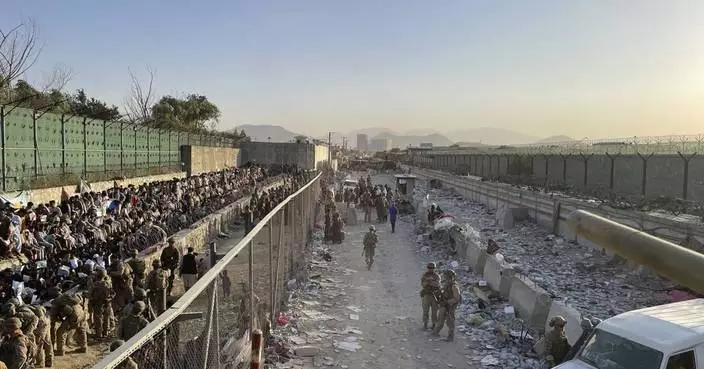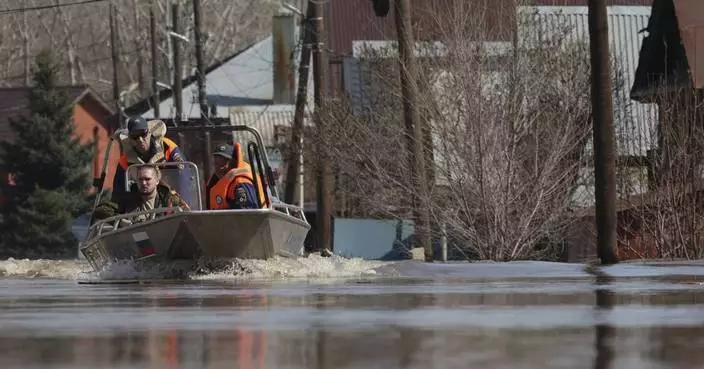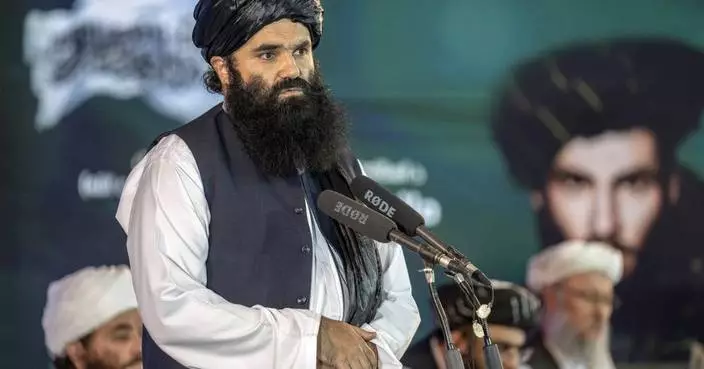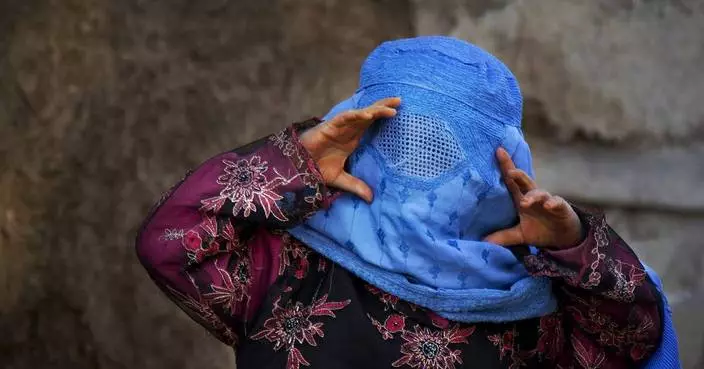The Afghan government said it would free 900 prisoners on Tuesday, its single largest prisoner release since the U.S. and the Taliban signed a peace deal earlier this year that spells out an exchange of detainees between the warring sides.
The announcement came as a three-day cease-fire with the insurgents draws to an end. The Taliban had called for the truce during the Muslim holiday of Eid al-Fitr that marks the end of the Islamic holy month of Ramadan.
There are expectations that the prisoner release could lead to new reductions in violence, and Taliban officials say they are considering an extension of the cease-fire.
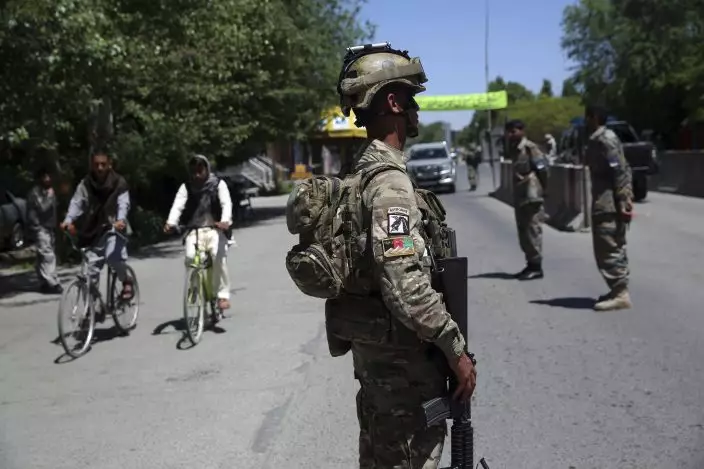
Security forces stand guard during the first day of Eid al-Fitr during a lockdown aimed at curbing the spread of the coronavirus in Kabul, Afghanistan, Sunday, May 24, 2020. The Taliban and Afghanistan's president announced late Saturday a three-day cease-fire ahead of a major Islamic holiday that begins Sunday to mark the end of the Islamic fasting month of Ramadan. (AP PhotoRahmat Gul)
A senior Taliban figure confirmed this to The Associated Press.
“If these developments, like the announcement of prisoner release continues, it is possible to move forward with decisions like extending the brief cease-fire and to move in a positive direction with some minor issues," the Taliban official said.
The prisoner release is part of the U.S. deal with the Taliban, signed on Feb. 29 to allow for the eventual withdrawal of U.S. and NATO troops from Afghanistan, bringing to an end the country's protracted war and America’s longest military involvement.
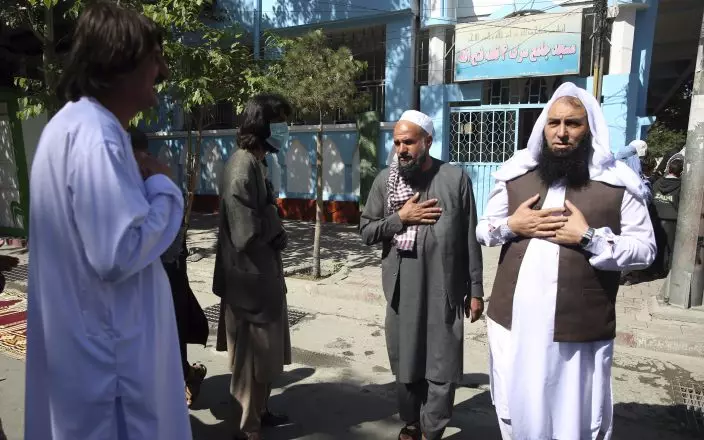
Men greeting each other after Eid al-Fitr prayers outside a mosque in Kabul, Afghanistan, Sunday, May 24, 2020. The Taliban and Afghanistan's president announced late Saturday a three-day cease-fire ahead of a major Islamic holiday that begins Sunday to mark the end of the Islamic fasting month of Ramadan. (AP PhotoRahmat Gul)
When the deal was signed, it was touted as Afghanistan's best chance for peace after decades of war but political feuding in Kabul and delays in prisoner exchanges have slowed the deal's progress toward intra-Afghan negotiations, considered the second and most critical phase of the accord.
Under the deal, Kabul is to release 5,000 Taliban prisoners while the insurgents are to free 1,000 captives they hold, mostly government officials and Afghan forces, before intra-Afghan negotiations can begin.
Afghan President Ashraf Ghani had welcomed the Taliban cease-fire announcement during the Muslim holiday.
Javid Faisal, a national security spokesman in Kabul, urged the Taliban to extend the cease-fire and said the government would release 900 prisoners on Tuesday.
That would bring to 2,000 the number of Taliban prisoners released so far under the U.S.-Taliban deal. The Taliban say they have released 240 of captives they held.
However, the Taliban have yet to confirm whether those released so far by the government were among the 5,000 names the insurgents had given U.S. negotiator Zalmay Khalilzad, the architect of the Feb. 29 deal.
A second Taliban official told the AP that those released so far were n fact on the Taliban list of demands, including the uncle of Taliban chief Hibatullah Akhundzada. Key in deciding which names would appear on the list was Mullah Nooruddin Turabi, a senior figure who had recently recovered from COVID-19, the illness caused by the coronavirus.
Turabi was the much feared vice and virtue minister during the Taliban rule, known for beating men who were found listening to music or not attending the mosque. He once slapped a Taliban commander who spoke with a woman journalist.
Both Taliban officials spoke to the AP on condition of anonymity because they were not authorized to talk to reporters.
.
WASHINGTON (AP) — Lawyers for an American believed to be held by the Taliban for nearly two years are asking a United Nations human rights investigator to intervene, citing what they say is cruel and inhumane treatment.
Ryan Corbett was abducted Aug. 10, 2022, after returning to Afghanistan, where he and his family had been living at the time of the collapse of the U.S.-based government there a year earlier. He arrived on a valid 12-month visa to pay and train staff as part of a business venture he led aimed at promoting Afghanistan's private sector through consulting services and lending.
Corbett has since been shuttled between multiple prisons, though his lawyers say he has not been seen since last December by anyone other than the people with whom he was detained.
In a petition sent Thursday, lawyers for Corbett say that he's been threatened with physical violence and torture and has been malnourished and deprived of medical care. He's been held in solitary confinement, including in a basement cell with almost no sunlight and exercise, and his physical and mental health have significantly deteriorated, the lawyers say.
Corbett has been able to speak with his family by phone five times since his arrest, including last month. His family has not been able to see him — his only visits have been two check-ins from a third-party government — and their characterizations of his mistreatment are based on accounts from recently released prisoners who were with him and his openly dispirited tone in conversations.
“During Mr. Corbett’s most recent call with his wife and children, Mr. Corbett indicated that the mental torture and anguish have caused him to lose all hope,” said the petition, signed by the Corbett family attorneys, Ryan Fayhee and Kate Gibson.
The petition is addressed to Alice Edwards, an independent human rights investigator and the special rapporteur for torture in the Office of the High Commissioner for Human Rights at the U.N. It asks Edwards, who was appointed by the U.N. Human Rights Council, to “urgently reach out to the Taliban to secure Mr. Corbett’s immediate release and freedom from torture, as guaranteed by international law.”
"This situation is just dragging on, and I’m increasingly concerned and taking steps that I hope will make a difference and help the situation — just increasingly concerned and panicking about Ryan’s deteriorating health and physical and mental health," Corbett's wife, Anna, said in an interview. “And that was leading me to take this next step.”
The U.S. government is separately working to get Corbett home and has designated him as wrongfully detained. A State Department spokesman told reporters last month that officials had continually pressed for Corbett's release and were “using every lever we can to try to bring Ryan and these other wrongfully detained Americans home from Afghanistan."
A spokesperson for the Interior Ministry in Afghanistan said this week that it had no knowledge of Corbett's case.
Corbett, of Dansville, New York, first visited Afghanistan in 2006 and relocated there with his family in 2010, supervising several non-governmental organizations.
The family was forced to leave Afghanistan in August 2021 when the Taliban captured Kabul, but he returned the following January so that he could renew his business visa. Given the instability on the ground, the family discussed the trip and “we were all pretty nervous,” Corbett's wife said.
But after that first uneventful trip, he returned to the country in August 2022 to train and pay his staff and resume a business venture that involved consulting services, microfinance lending and evaluating international development projects.
While on a trip to the northern Jawzjan province, Corbett and a Western colleague were confronted by armed members of the Taliban and were taken first to a police station and later to an underground prison.
Anna Corbett said that when she learned her husband had been taken to a police station, she got “really scared” but that he was optimistic the situation would be quickly resolved.
That, however, did not happen, and Anna Corbett, who has three teenage children and makes regular trips to Washington, said she's trying to advocate as forcefully as she can while not letting “anxiety take over.”
“I feel like it’s the uncertainty of all of it that just is so difficult because you just don’t know what’s going to come at you — what call, what news," she said. "And I’m worried about Ryan and the effect of the trauma on him and then also on my kids, just what they’re experiencing. I've tried to protect them the best I could, but this is so difficult.”
Associated Press writer Riazat Butt in Kabul, Afghanistan, contributed to this report.
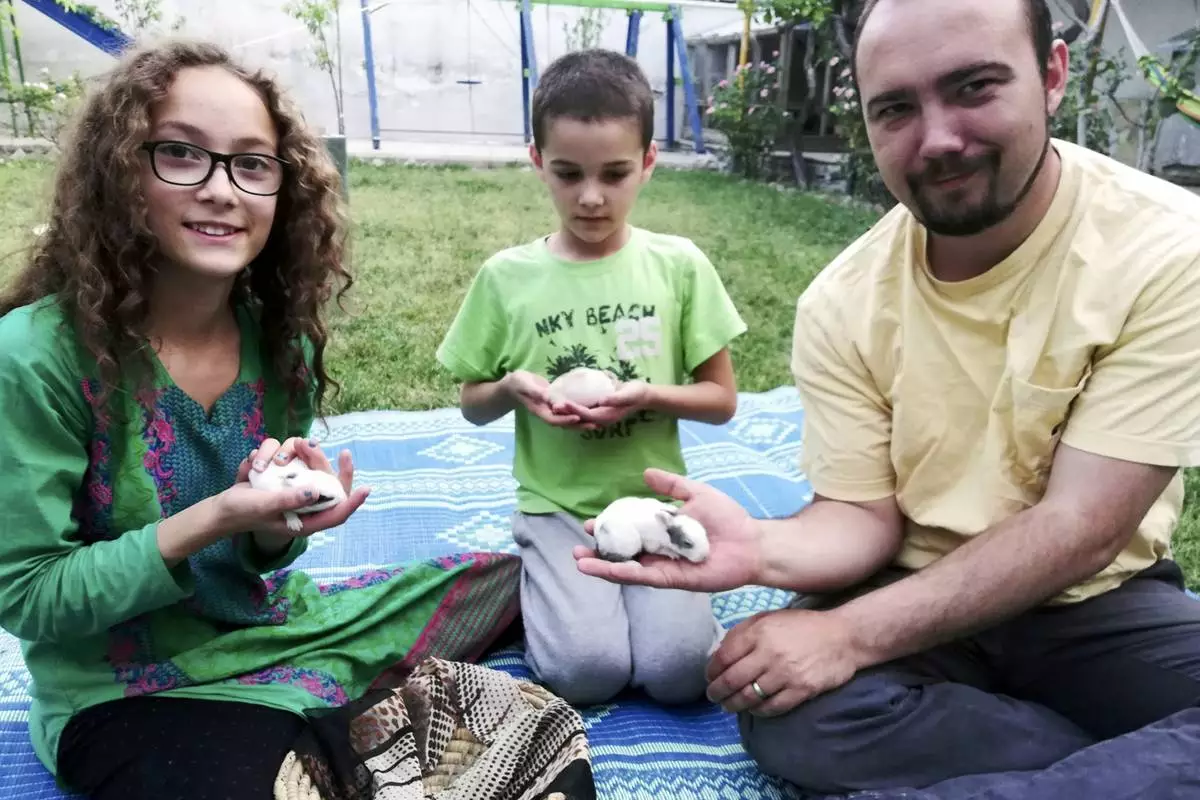
This family photo shows Ryan Corbett holding rabbits with his daughter Miriam and son Caleb in Kabul, Afghanistan in 2020. Lawyers for Corbett, believed held by the Taliban for nearly two years, are asking a United Nations human rights investigator to intervene, citing what they say is cruel and inhumane treatment. Corbett was abducted on August 10, 2022 after returning to Afghanistan, where he and his family had been living at the time of the collapse of the U.S.-based government there one year earlier, on a valid 12-month business visa to pay and train staff. (AP Photo/Anna Corbett)






